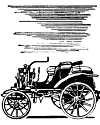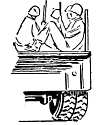 But a new type of vehicle was coming into the picture
- the automobile. And, like the bicycle, these early horseless
carriages were usually bought by sportsmen. This was particularly
true in France. Michelin, the
French rubber manufacturer, learning how successful the pneumatic
tire was in increasing the speed of bicycles, tried for several years
to interest the automobile manufacturers in France in this
new type of tire for their faster cars. At last, he convinced some
of the French makers, and in 1895, the pneumatic tire came into regular
use on automobiles.
But a new type of vehicle was coming into the picture
- the automobile. And, like the bicycle, these early horseless
carriages were usually bought by sportsmen. This was particularly
true in France. Michelin, the
French rubber manufacturer, learning how successful the pneumatic
tire was in increasing the speed of bicycles, tried for several years
to interest the automobile manufacturers in France in this
new type of tire for their faster cars. At last, he convinced some
of the French makers, and in 1895, the pneumatic tire came into regular
use on automobiles.The story of Dunlop's development is no different from the experiences of many other inventors. It simply is impossible to determine the ultimate value of any invention at the time it is made.  It would be just as difficult for parents to predict the exact future
of their newborn child. Dunlop could not foresee that an entirely
new industry would come from his invention, to say nothing of his
being able to establish it as one of the most important factors in a
World War fifty years later.
It would be just as difficult for parents to predict the exact future
of their newborn child. Dunlop could not foresee that an entirely
new industry would come from his invention, to say nothing of his
being able to establish it as one of the most important factors in a
World War fifty years later. |








